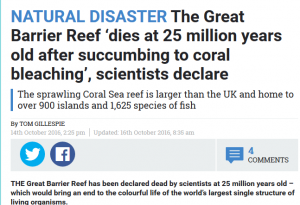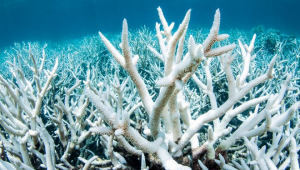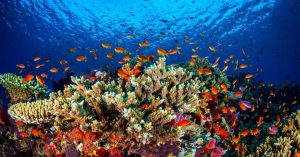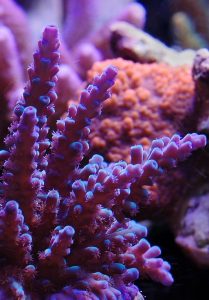The threat of climate change for coral reef ecosystems across the world
By Claire Murray, University of Southampton student

Coral reefs are unique, awe-inspiring ecosystems; distinctively bright, bursting with biodiversity. However, they are already facing impacts of climate change. Headlines last year claimed the death of the most famous coral reef system on earth – the Great Barrier Reef. Whilst the story was greatly exaggerated, the possibility of the threat is all too real.

The importance of coral
Coral is a living organism, with algae it’s partnering, symbiotic component. Algae and coral are mutually dependent on each other for survival; providing food and a habitat respectively. However, coral bleaching is the loss of the symbiotic algae, occurring due to intolerance to changing environmental conditions such as increased sea temperatures. This is visually evident as a loss of pigmentation; replacing vibrant colours with the white colour of the coral’s calcium structure (Antonelli, et al., 2013). Increasing sea temperatures are a certain consequence of climate change, meaning that more coral bleaching could occur as temperatures increase in the near future (Antonelli, et al., 2013).

What’s the catch?
Coral reefs provide important local ecosystem services, including coastal protection and fishery support (Hicks & Cinner, 2014). Corals are the main habitat-forming organism in the reef ecosystem – centrally important for biological and physical structure (Coker, et al., 2014). Various species are supported within the ecosystem, making reefs biodiversity hotspots (Hicks & Cinner, 2014). However, rising global sea temperatures are an environmental driver of the change being seen in ecosystems; threatening the benefits the ecosystem brings.
Threats to coral reefs are two-fold: global climate change pressures, and local anthropogenic pressures (Mongin, et al., 2016). Local stressors include pollution, sedimentation and overfishing (Ateweberhan, et al., 2013). Coral reefs are highly sensitive to the global risks of ocean acidification and warming (Ateweberhan, et al., 2013; Wolff, et al., 2015; Van Hooidonk, et al., 2014). The loss of the physical habitat ultimately threatens the abundance of marine life that depends on coral for its survival, reducing the resilience of the ecosystem as a whole.

All bad news?
There is inequity of climate change impacts across coral reefs – for example, the Caribbean is likely to experience only relatively low levels of stress (Wolff, et al., 2015). The rates of environmental change also varies at different latitudes, meaning impacts will be staggered throughout the ecosystems on a global scale (Van Hooidonk, et al., 2014).
Despite the obvious negatives experience by the majority of coral reefs, it’s not bad news everywhere. Acropora corals seen on the northern Gulf of Mexico and on the Florida peninsula are extending their range – resulting in new, ‘novel’ ecosystems (Graham, et al., 2014). The emergence of new communities demonstrates the changing dynamics of the ecosystem.
The diverse environmental changes being seen globally are certainly going to impact coral reef ecosystems, and predominantly in a negative way. However some positives are likely; so not all hope is lost. But in the meantime, it might be worth visiting the Great Barrier Reef before it’s too late…
[Word count: 499 words]
References
Antonelli, P. L., Rutz, S. F., Sammarco, P. W. & Strychar, K. B., 2013. A coral bleaching model. Nonlinear Analysis: Real World Applications, Volume 16, pp. 65-73.
Ateweberhan, M. et al., 2013. Climate change impacts on coral reefs: Synergies with local effects,. Marine Pollution Bulletin, 74(2), pp. 526-539.
Coker, D. J., Wilson, S. K. & Pratchett, M. S., 2014. Importance of live coral habitat for reef fishes. Reviews in Fish Biology and Fisheries, 24(1), pp. 89-126.
Graham, N. A. J., Cinner, J. E., Norstrom, A. V. & Nystrom, M., 2014. Coral reefs as novel ecosystems: embracing new futures. Current Opinion in Environmental Sustainability, Volume 7, pp. 9-14.
Mongin, M. et al., 2016. The exposure of the Great Barrier Reef to ocean acidification. Nature communications, 7(10732), pp. 1-8.
Van Hooidonk, R., Maynard, J. A., Mazello, D. & Planes, S., 2014. Opposite latitudinal gradients in projected ocean acidification and bleaching impacts on coral reefs. Global Change Biology, 20(1), pp. 103-112.
Wolff, N. H. et al., 2015. Global inequities between polluters and the polluted: climate change impacts on coral reefs. Global Change Biology, 21(11), pp. 3982-3994.
Recent Comments